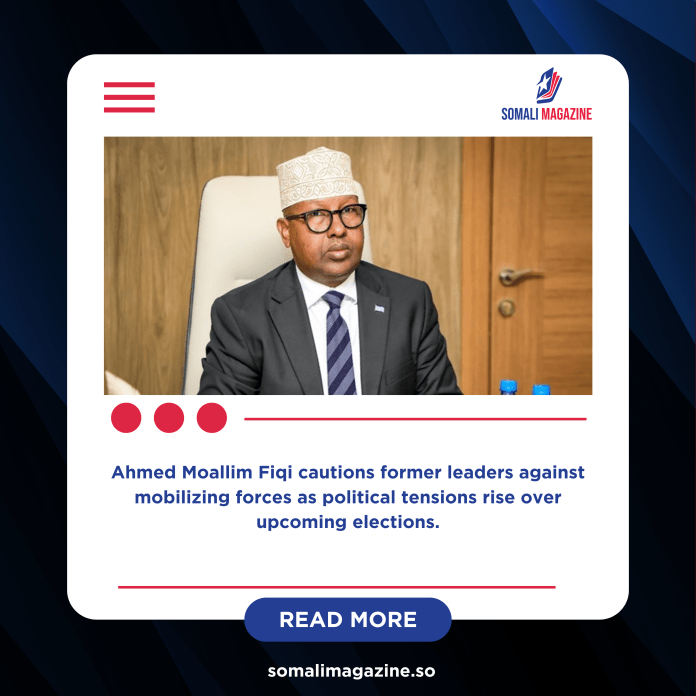Facebook Twitter (X) Instagram Somali Magazine - People's Magazine
Somalia’s Defense Minister, Ahmed Moallim Fiqi, has issued a strong warning to opposition leaders, cautioning them against using the military or resorting to armed conflict as a way of settling political disputes. His remarks come at a time when tensions between the government and opposition groups have intensified, especially after recent talks with President Hassan Sheikh Mohamud ended without agreement.
The defense minister directly called out several well-known political figures, including former President Sharif Sheikh Ahmed, former Prime Ministers Hassan Ali Khayre and Mohamed Hussein Rooble, Member of Parliament Abdirahman Abdishakur Warsame, and former Foreign Minister Ahmed Isse Awad. According to Fiqi, these leaders are fueling political unrest and could be plotting actions that might endanger the stability and security of the country.
Fiqi warned that any attempt by politicians to mobilize armed groups or the national army against the government would not be tolerated. “They should not think of taking up arms against the government to intimidate the government or the people. Anyone who tries to do so will be met with the full force of the law and the national army,” he said.
The warning comes at a sensitive moment. Somalia is preparing for its next electoral process, and opposition leaders have openly voiced concerns about how the elections will be managed. Their worries mainly focus on the transparency of the process, the role of regional states, and whether the government will allow a fair and inclusive vote. These disputes reflect the deep mistrust between the government and opposition, which has historically created political crises in Somalia.
Earlier this month, a meeting between government officials and opposition leaders was held with the hope of easing tensions and finding common ground. However, the talks ended without any progress, leaving both sides further apart and fueling public uncertainty about what might come next.
The defense minister’s remarks have sparked debate among analysts and observers. Some believe his statement was meant to intimidate opposition leaders and discourage them from challenging the government. Others argue that his comments highlight a real risk: that opposition leaders, frustrated with the political process, could turn to armed confrontation as has happened in Somalia’s past.
Somalia has a long and difficult history with political violence. Disagreements among leaders in the past have often escalated into armed conflict, costing the country stability and weakening its institutions. The minister’s warning is therefore seen by some as a reminder of the dangers of repeating old mistakes.
Opposition figures, on the other hand, argue that their concerns are legitimate and that the government must ensure an open and fair electoral system. They say mistrust in how elections are organized is one of the biggest triggers of political unrest in Somalia. Without reforms and dialogue, they warn, tensions could easily spiral out of control.
For ordinary Somalis, the current standoff is worrying. Many citizens are weary of endless political disputes that take attention away from urgent national issues such as insecurity, poverty, unemployment, and the ongoing threat of al-Shabab. People hope that both the government and opposition will avoid confrontation and instead work together to secure peace and stability.
The coming months will be critical for Somalia. If leaders choose dialogue and compromise, the country could move closer to building a stable democratic process. But if political disagreements turn into armed confrontations, Somalia risks sliding back into another cycle of violence.
For now, the defense minister’s warning stands as both a message and a test: a message to opposition leaders that armed politics will not be tolerated, and a test of whether Somalia’s fragile political system can withstand the mounting tensions.

